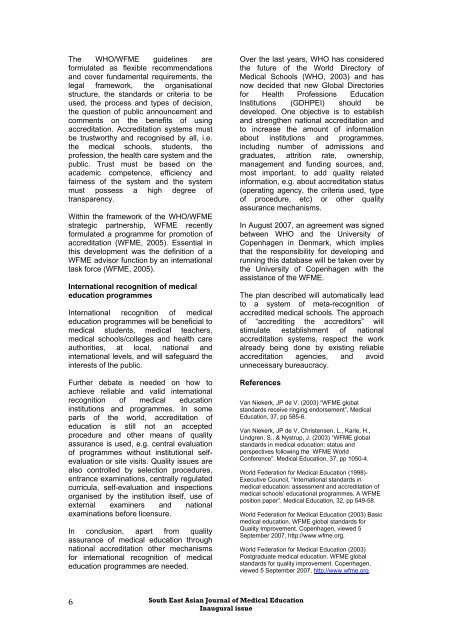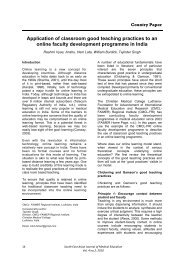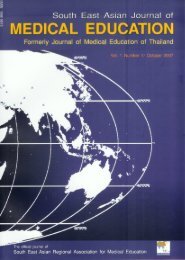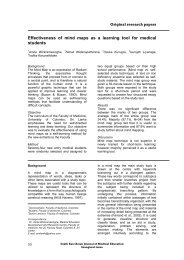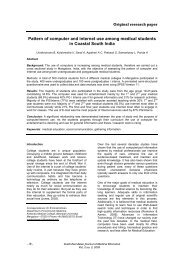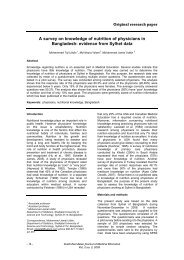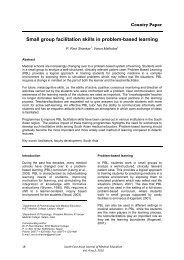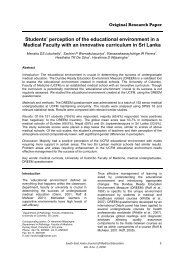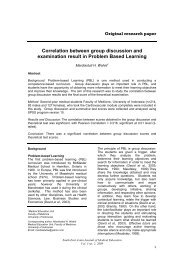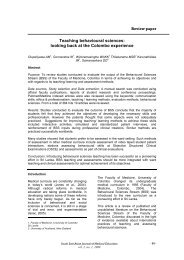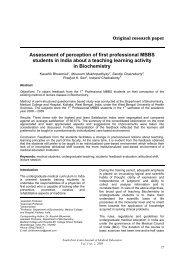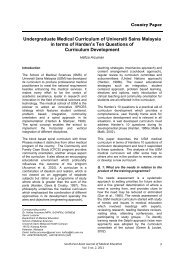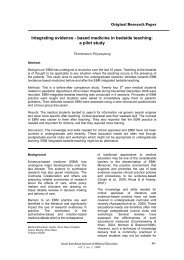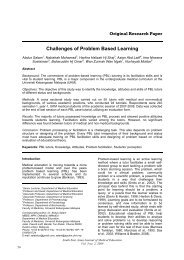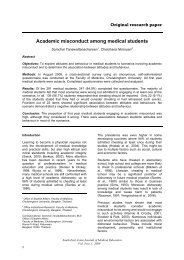Relevance of the WFME global standards in medical education to ...
Relevance of the WFME global standards in medical education to ...
Relevance of the WFME global standards in medical education to ...
You also want an ePaper? Increase the reach of your titles
YUMPU automatically turns print PDFs into web optimized ePapers that Google loves.
The WHO/<strong>WFME</strong> guidel<strong>in</strong>es are<br />
formulated as flexible recommendations<br />
and cover fundamental requirements, <strong>the</strong><br />
legal framework, <strong>the</strong> organisational<br />
structure, <strong>the</strong> <strong>standards</strong> or criteria <strong>to</strong> be<br />
used, <strong>the</strong> process and types <strong>of</strong> decision,<br />
<strong>the</strong> question <strong>of</strong> public announcement and<br />
comments on <strong>the</strong> benefits <strong>of</strong> us<strong>in</strong>g<br />
accreditation. Accreditation systems must<br />
be trustworthy and recognised by all, i.e.<br />
<strong>the</strong> <strong>medical</strong> schools, students, <strong>the</strong><br />
pr<strong>of</strong>ession, <strong>the</strong> health care system and <strong>the</strong><br />
public. Trust must be based on <strong>the</strong><br />
academic competence, efficiency and<br />
fairness <strong>of</strong> <strong>the</strong> system and <strong>the</strong> system<br />
must possess a high degree <strong>of</strong><br />
transparency.<br />
With<strong>in</strong> <strong>the</strong> framework <strong>of</strong> <strong>the</strong> WHO/<strong>WFME</strong><br />
strategic partnership, <strong>WFME</strong> recently<br />
formulated a programme for promotion <strong>of</strong><br />
accreditation (<strong>WFME</strong>, 2005). Essential <strong>in</strong><br />
this development was <strong>the</strong> def<strong>in</strong>ition <strong>of</strong> a<br />
<strong>WFME</strong> advisor function by an <strong>in</strong>ternational<br />
task force (<strong>WFME</strong>, 2005).<br />
International recognition <strong>of</strong> <strong>medical</strong><br />
<strong>education</strong> programmes<br />
International recognition <strong>of</strong> <strong>medical</strong><br />
<strong>education</strong> programmes will be beneficial <strong>to</strong><br />
<strong>medical</strong> students, <strong>medical</strong> teachers,<br />
<strong>medical</strong> schools/colleges and health care<br />
authorities, at local, national and<br />
<strong>in</strong>ternational levels, and will safeguard <strong>the</strong><br />
<strong>in</strong>terests <strong>of</strong> <strong>the</strong> public.<br />
Fur<strong>the</strong>r debate is needed on how <strong>to</strong><br />
achieve reliable and valid <strong>in</strong>ternational<br />
recognition <strong>of</strong> <strong>medical</strong> <strong>education</strong><br />
<strong>in</strong>stitutions and programmes. In some<br />
parts <strong>of</strong> <strong>the</strong> world, accreditation <strong>of</strong><br />
<strong>education</strong> is still not an accepted<br />
procedure and o<strong>the</strong>r means <strong>of</strong> quality<br />
assurance is used, e.g. central evaluation<br />
<strong>of</strong> programmes without <strong>in</strong>stitutional selfevaluation<br />
or site visits. Quality issues are<br />
also controlled by selection procedures,<br />
entrance exam<strong>in</strong>ations, centrally regulated<br />
curricula, self-evaluation and <strong>in</strong>spections<br />
organised by <strong>the</strong> <strong>in</strong>stitution itself, use <strong>of</strong><br />
external exam<strong>in</strong>ers and national<br />
exam<strong>in</strong>ations before licensure.<br />
In conclusion, apart from quality<br />
assurance <strong>of</strong> <strong>medical</strong> <strong>education</strong> through<br />
national accreditation o<strong>the</strong>r mechanisms<br />
for <strong>in</strong>ternational recognition <strong>of</strong> <strong>medical</strong><br />
<strong>education</strong> programmes are needed.<br />
Over <strong>the</strong> last years, WHO has considered<br />
<strong>the</strong> future <strong>of</strong> <strong>the</strong> World Direc<strong>to</strong>ry <strong>of</strong><br />
Medical Schools (WHO, 2003) and has<br />
now decided that new Global Direc<strong>to</strong>ries<br />
for Health Pr<strong>of</strong>essions Education<br />
Institutions (GDHPEI) should be<br />
developed. One objective is <strong>to</strong> establish<br />
and streng<strong>the</strong>n national accreditation and<br />
<strong>to</strong> <strong>in</strong>crease <strong>the</strong> amount <strong>of</strong> <strong>in</strong>formation<br />
about <strong>in</strong>stitutions and programmes,<br />
<strong>in</strong>clud<strong>in</strong>g number <strong>of</strong> admissions and<br />
graduates, attrition rate, ownership,<br />
management and fund<strong>in</strong>g sources, and,<br />
most important, <strong>to</strong> add quality related<br />
<strong>in</strong>formation, e.g. about accreditation status<br />
(operat<strong>in</strong>g agency, <strong>the</strong> criteria used, type<br />
<strong>of</strong> procedure, etc) or o<strong>the</strong>r quality<br />
assurance mechanisms.<br />
In August 2007, an agreement was signed<br />
between WHO and <strong>the</strong> University <strong>of</strong><br />
Copenhagen <strong>in</strong> Denmark, which implies<br />
that <strong>the</strong> responsibility for develop<strong>in</strong>g and<br />
runn<strong>in</strong>g this database will be taken over by<br />
<strong>the</strong> University <strong>of</strong> Copenhagen with <strong>the</strong><br />
assistance <strong>of</strong> <strong>the</strong> <strong>WFME</strong>.<br />
The plan described will au<strong>to</strong>matically lead<br />
<strong>to</strong> a system <strong>of</strong> meta-recognition <strong>of</strong><br />
accredited <strong>medical</strong> schools. The approach<br />
<strong>of</strong> “accredit<strong>in</strong>g <strong>the</strong> accredi<strong>to</strong>rs” will<br />
stimulate establishment <strong>of</strong> national<br />
accreditation systems, respect <strong>the</strong> work<br />
already be<strong>in</strong>g done by exist<strong>in</strong>g reliable<br />
accreditation agencies, and avoid<br />
unnecessary bureaucracy.<br />
References<br />
Van Niekerk, JP de V. (2003) “<strong>WFME</strong> <strong>global</strong><br />
<strong>standards</strong> receive r<strong>in</strong>g<strong>in</strong>g endorsement”, Medical<br />
Education, 37, pp 585-6.<br />
Van Niekerk, JP de V, Christensen, L., Karle, H.,<br />
L<strong>in</strong>dgren, S., & Nystrup, J. (2003) “<strong>WFME</strong> <strong>global</strong><br />
<strong>standards</strong> <strong>in</strong> <strong>medical</strong> <strong>education</strong>: status and<br />
perspectives follow<strong>in</strong>g <strong>the</strong> <strong>WFME</strong> World<br />
Conference”. Medical Education, 37, pp 1050-4.<br />
World Federation for Medical Education (1998)-<br />
Executive Council, “International <strong>standards</strong> <strong>in</strong><br />
<strong>medical</strong> <strong>education</strong>: assessment and accreditation <strong>of</strong><br />
<strong>medical</strong> schools’ <strong>education</strong>al programmes. A <strong>WFME</strong><br />
position paper”. Medical Education, 32, pp 549-58.<br />
World Federation for Medical Education (2003) Basic<br />
<strong>medical</strong> <strong>education</strong>. <strong>WFME</strong> <strong>global</strong> <strong>standards</strong> for<br />
Quality Improvement. Copenhagen, viewed 5<br />
September 2007, http://www.wfme.org.<br />
World Federation for Medical Education (2003)<br />
Postgraduate <strong>medical</strong> <strong>education</strong>. <strong>WFME</strong> <strong>global</strong><br />
<strong>standards</strong> for quality improvement. Copenhagen,<br />
viewed 5 September 2007, http://www.wfme.org.<br />
6<br />
South East Asian Journal <strong>of</strong> Medical Education<br />
Inaugural issue


